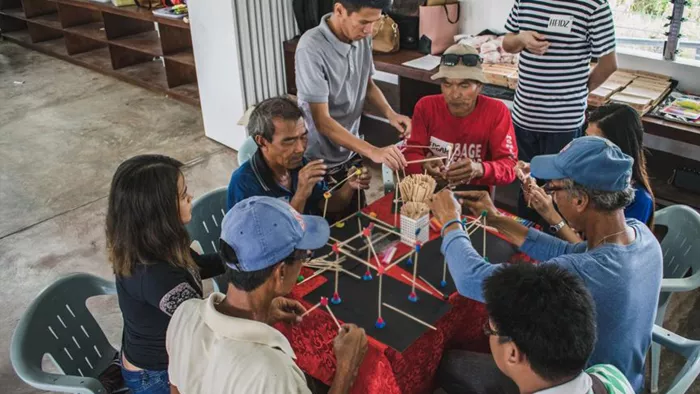ABOUT THE PROGRAMME
During humanitarian crises when state agencies are unable to cope , strong leadership from aid organisations is essential in order to respond quickly. In the past, the humanitarian sector has looked to international aid organisations to provide this leadership. However, those closest to the disaster are uniquely placed to provide strong leadership and faster response, but sometimes lack the necessary training and skills to do so.
The humanitarian system needs to invest in leadership and raise the level of professionalism across the sector, so that national-level organisations are strong enough to lead a response. Talent Development focused specifically on developing national capacity; national staff of international non-governmental organisations (INGOs), non-governmental organisations (NGOs), civil society and the government.
The project bridged the gap through training and development opportunities, offering an innovative ‘package offer’ that strengthened three existing high-quality programmes. The project avoided a one-size-fits-all approach and instead focused on the individual development of participants.
The project delivered three learning and development programmes; an entry-level trainee scheme, mid-level training, and leadership training – supported by a network of specially-trained locally- or regionally-based coaches.
ENTRY-LEVEL TRAINING
The entry-level fast-track trainee scheme was led by Save the Children for 175 participants. This provided on-the-job learning, simulation training, distance learning, and coaching.
Find out more.
MID-LEVEL CONTEXT TRAINING
A mid-level ‘Context’ programme was led by Oxfam Great Britain and implemented by BIOFORCE, MzN international and RedR UK for 640 participants. This provided long-term learning and development through face-to-face group-based learning, coaching, individual project work and web-based learning.
Find out more.
SENIOR-LEVEL ‘LEADERSHIP FOR HUMANITARIANS’ TRAINING
The senior-level ‘Leadership for Humanitarians’ programme was led by Relief International for 240 participants. This provided learning and development through face-to-face workshops, follow-on action planning, distance learning and coaching.
Find out more.
COACHING
A cross-cutting strand of action led by the CHS Alliance (formerly People in Aid) developed an in-house coaching cohort and a network of locally- and regionally-based coaches.
COMPETENCIES
The CHS Alliance reviewed, revised and promoted the Core Humanitarian Competencies Framework, in order to develop its use as the ’industry standard’. It also designed a tool to assess competence before and after learning interventions.
WHO WAS INVOLVED?
This project was delivered by a consortium led by Save the Children UK and included Oxfam, Relief International and CHS Alliance.
Other partners included:
www.redr.org.uk
www.bioforce.asso.fr
mzninternational.com
Leadership for Humanitarians
www.brookes.ac.uk
WHERE DID THE PROJECT TAKE PLACE?
The project ran in Kenya, Ethiopia, Bangladesh and Jordan. The mid-level ‘Context’ training was also in the Democratic Republic of Congo.
FUNDING
The three year project was funded with £5,985,087 from UK Aid, part of the Disaster and Emergencies Preparedness Programme (DEPP).
KEY CONTACTS
For overall project management Carol Hatchett, Save the Children UK
For the entry-level humanitarian trainee schemes Ruth Talbot, Save the Children UK
For the mid-level ‘Context’ training programme Gaël Rennesson, Oxfam GB
For the senior-level ‘Leadership for Humanitarians’ training programme Tamara Szarlat, Relief International
For the coaching network and revision of the Core Humanitarian Competency Framework Verity Stiff, CHS Alliance

